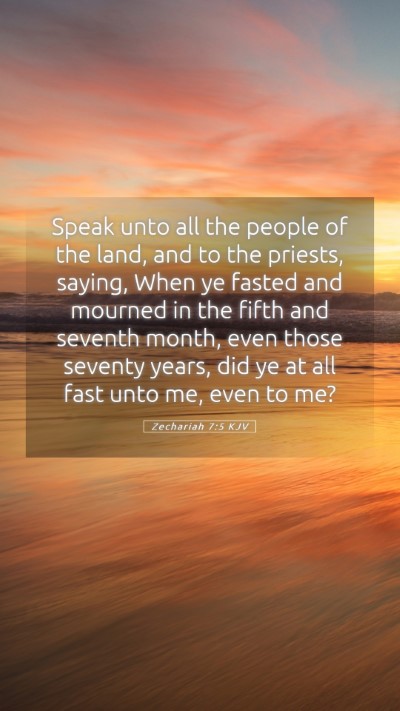Old Testament
Genesis Exodus Leviticus Numbers Deuteronomy Joshua Judges Ruth 1 Samuel 2 Samuel 1 Kings 2 Kings 1 Chronicles 2 Chronicles Ezra Nehemiah Esther Job Psalms Proverbs Ecclesiastes Song of Solomon Isaiah Jeremiah Lamentations Ezekiel Daniel Hosea Joel Amos Obadiah Jonah Micah Nahum Habakkuk Zephaniah Haggai Zechariah MalachiZechariah 7:5 Meaning
What is the meaning of Zechariah 7:5?
Speak unto all the people of the land, and to the priests, saying, When ye fasted and mourned in the fifth and seventh month, even those seventy years, did ye at all fast unto me, even to me?
Zechariah 7:5 Bible Verse Meaning
Understanding Zechariah 7:5 - A Comprehensive Bible Verse Commentary
Zechariah 7:5 reads: "Speak unto all the people of the land, and to the priests, saying, When ye fasted and mourned in the fifth and seventh month, even those seventy years, did ye at all fast unto me, even to me?" This verse calls for a profound reflection on the nature and intention behind fasting and mourning among the Israelites during their captivity.
Bible Verse Meanings and Interpretations
This verse significantly addresses the spiritual state and practice of the Jewish people. It questions the authenticity of their religious observance. Through insights gathered from Matthew Henry, Albert Barnes, and Adam Clarke, we can unfold a deeper understanding of its meaning:
- Matthew Henry's Commentary:
Henry suggests that God through Zechariah was reminding the people of the purpose of their fasting. It serves as a spiritual inquiry into whether their external expressions of grief were genuine offerings or mere rituals devoid of true devotion. He indicates that mere observance without aligning with God’s intent is fruitless.
- Albert Barnes' Notes:
Barnes emphasizes the historical context of the verse, identifying the fasting periods the Israelites observed as responses to their suffering from exile. His commentary indicates that their observances were often self-centered rather than aimed towards God’s glory, prompting him to question their motives: were these fasts to truly seek communion with God?
- Adam Clarke's Commentary:
Clarke elucidates that the fasts mentioned (in the fifth and seventh months) had become institutionalized, losing their essence. He stresses that God desires a sincere heart behind acts of worship. Clarke asserts that this verse serves as a pivotal reminder for believers to examine the sincerity behind their worship and repentance.
Analytical Insights on the Intent of Fasting
Fasting is a common spiritual practice in Judaism, often associated with mourning, repentance, and devotion. However, Zechariah 7:5 challenges the community to look inwardly and ask whether these acts were performed with a heart towards God or simply to mark a time of suffering.
Key questions arise from this inquiry:
- Are our religious practices mere traditions?
- Do we engage in prayer and fasting with a genuine heart towards God?
Practical Applications of Zechariah 7:5
This verse encourages individuals and groups involved in Bible study to consider the relevance of their own spiritual practices. It calls for a reassessment of how they approach worship, fasting, and other religious expressions. Here are some practical principles for application:
- Introspection: Regularly evaluate your motives regarding spiritual practices.
- Teaching: Promote discussions in Bible study groups about the significance of true humility and sincerity in worship.
- Accountability: Cultivate environments where individuals can support each other in deepening their faith.
Contextual and Historical Insights
The backdrop of Zechariah’s message is essential for understanding this verse's implications. After returning from exile, the Israelites grappled with establishing their identity. Their past experiences necessitated a longing for a renewed relationship with God, which required more than ceremonial observance of fasts.
This verse's challenge maintains relevance today as believers navigate through their rituals, ensuring that personal and communal worship reflects a heart aligned with God’s will.
Cross References for Further Study
To deepen your analysis and understanding of Zechariah 7:5, consider exploring the following cross-references:
- Isaiah 58:5-7: Discusses the true nature of fasting and the kind of fast that pleases God.
- Joel 2:12-13: Calls for genuine repentance with a whole heart.
- Matthew 6:16-18: Jesus teaches about fasting for God, not for human recognition.
Conclusion
In summary, Zechariah 7:5 serves as an enduring reminder for all believers to examine the motives behind their religious practices. Engaging with this verse through the lens of Bible study insights, prayer, and reflection can lead to a more sincere and fulfilling spiritual life. This verse challenges us not just to observe rituals but to understand their meaning and purpose within our relationship with God.


